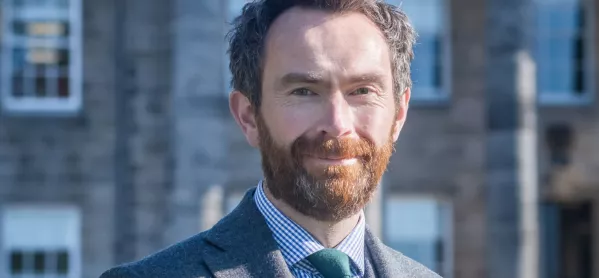- Home
- Analysis
- Specialist Sector
- Tes’ 10 questions with... Ian Munro
Tes’ 10 questions with... Ian Munro

Ian Munro is rector (headteacher) at Dollar Academy in central Scotland.
Answering Tes Scotland’s 10 questions, he tells us about the simple change that “did marvels” for his productivity, a lesson and an assembly that are etched in his memory - for very different reasons - and the inspirational teacher who could not believe he was paid for what he did.
1. What I wish I’d known when I started teaching is…
That enthusiasm and creativity must never be taken for granted.
I have learned that within schools, whether it be in classrooms, staffrooms or administrative offices, enthusiasm and creativity can sometimes be seen as wishy-washy and abstract concepts to be undervalued. Such is the great moral imperative to get education “right”, we need open-minded forward thinkers - as well as critical friends - to make sure our pupils and schools keep pace with the world around them.
2. The most important qualities a teacher needs are…
You do need to know what you are talking about, so strong subject knowledge is important. This said, on its own it’s probably not enough. For example, if you can’t show kindness and understanding to your pupils and colleagues, you may well be on a hiding to nothing. Needless to say, I never liked the bizarre “don’t smile until after Christmas” adage.
Every school year is full of great highs and moments of real sadness. Kindness can amplify the highs and provide a stabilising anchor through the lows. It’s another one of those qualities, or values, that shouldn’t be cast aside and undervalued because it can be at times difficult to describe or quantify. It should be thought about, practised and understood by all of us in schools.
3. The most important lesson I’ve learned from doing this job is…
Shoot for the moon. I have always been frustrated by those who are quick to bemoan either the education system at large or the school they work at but seem unwilling to take any steps to improve things. Empowerment can be a complicated thing, but part of my job that I really enjoy is listening to ideas about how we can make improvements for our pupils and then helping to realise these ambitions. Nobody has a monopoly on good ideas.
4. The best change I ever made in my practice was…
It’s not the most seismic shift in leadership practice, but accepting that my best “desk work” was rarely done between 5pm and 6pm did marvels for my productivity. Sometimes it is best to take a wee break before coming back afresh to the task at hand.
5. If I could change something about Scottish education it would be…
I think we need to improve our ability to recognise, celebrate and then scale up across the entire system some of the wonderful practice that takes place in our schools every day. Too often we adopt a binary approach to evaluating our education system, whereas the reality is that a whole spectrum exists between the extremes of “broken” and “high-performing”. I think the government could lift standards by listening more actively to pupils, teachers, school leaders and, importantly, educational researchers.
There are also questions to be asked about funding and how a country can get “bang for its buck” when it comes to education. I can’t help but worry that we are sometimes a bit too insular in our thinking in Scotland about how best to develop our education system. I sit on the advisory board of the NuVu innovation school in the United States, and therefore I know from experience that there are lots of lessons to be learned from a wide range of international perspectives. Context is, of course, king, but there are many impactful case studies that we should be cognisant of when considering how to improve Scottish education.
Closer to home, for example, I recently set up Fida (Futures Institute at Dollar Academy) as an open-access online learning platform that empowers young people to learn in new ways, through innovative projects rooted in the United Nations’ sustainable development goals. Fida addresses three fundamental challenges - sustainability, equitable access to education and the need for curricular reform. The courses have been developed with industry partners such as Highland Spring, Johnstons of Elgin and Scottish Ballet, and have proved popular with youngsters throughout Scotland. I was very pleased when Professor Ken Muir recently endorsed the initiative, stating that it supported many of the recommendations in his recent report on education reform in Scotland.
Ultimately, my great hope is that we are entering a period of ambition for our education system and, by extension, all the young people involved in it.
6. My most memorable moment as a teacher was…
I have so many special memories from my career to date, most of which are to do with pupils and colleagues discovering a passion and demonstrating great capacity for personal growth. More personally, I remember just how nervous I was before taking my first-ever lesson as a student teacher: S3 biology - structure and function of the heart.

7. The worst mistake I ever made was…
Hmm, this might be the story of the projectile-vomiting Christmas elf. I obviously had no idea the elf was so unwell. It made for an interesting assembly - especially for the front row. Enough said.
8. My top tip for aspiring teachers is…
Go for it! We need clever and enthusiastic entrants to the profession who recognise that being entrusted with the care and development of children and young adults is a genuine privilege.
I understand that teaching might not be for everyone, so, on a practical level, I think all aspiring teachers should try and spend time in a variety of school settings - classrooms, staffrooms, sports pitches, theatres and so on, to get a feel for things.
I remember that one of my own teachers told me that he did not really see teaching as a “job” per se. In part, I think he was talking about the fact that teaching is probably best viewed as a vocation, and it’s certainly not one to take lightly. Teachers can work incredibly hard across a number of workstreams such as diversity, equality, teaching and learning and pastoral care, with little respite during term time. However, what I think Mr Stewart was really getting at was that he could not believe a paid job could be so much fun. Needless to say, his biology lessons were the best.
9. When dealing with challenging pupils, my go-to strategy is…
Listen. Attempt to see the world through their eyes. Agree a way forward.
We all get things right and we all make mistakes. That’s life. When youngsters are navigating the tricky business of growing up there will always be bumps in the road. Seeking to understand these as well as possible gives those of us working in schools the best chance of moving things forward constructively. Where appropriate, I think it is crucial that schools quickly recognise the importance of working with specialist partners, such as educational psychologists and social workers, so that they can plot the best course forward.
10. The best CPD I ever did was…
I have always enjoyed reading educational research. Not so much the popularist stuff but the peer-reviewed data and case study work that comes out of some of our great universities.
Moreover, I view teaching and leadership themselves as a form of learning. For example, every pupil and each operational or strategic decision requires much thought from as diverse a range of perspectives as you can muster. Lots of this comes from lived experience, but the research literature - from various disciplines and industries - can also play a very important role. In the end, teaching is a demanding and skilled craft, so finding a form of CPD that works for each individual is incredibly important.
*More educators answer Tes Scotland’s 10 questions:
- Additional support needs teacher Aidan Miller.
- Early years leader Teresa Porter.
- Primary headteacher Jenny Watson.
- Secondary headteacher Bruce Robertson.
- Independent school head Melvyn Roffe.
You need a Tes subscription to read this article
Subscribe now to read this article and get other subscriber-only content:
- Unlimited access to all Tes magazine content
- Exclusive subscriber-only stories
- Award-winning email newsletters
Already a subscriber? Log in
You need a subscription to read this article
Subscribe now to read this article and get other subscriber-only content, including:
- Unlimited access to all Tes magazine content
- Exclusive subscriber-only stories
- Award-winning email newsletters
topics in this article



